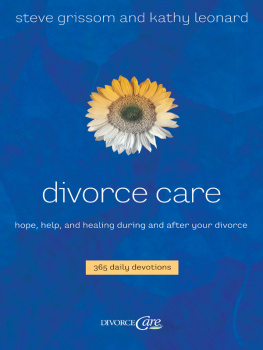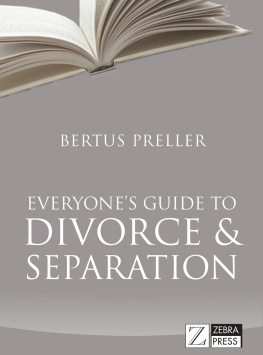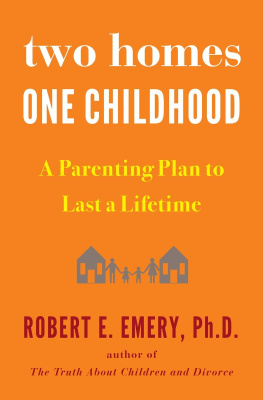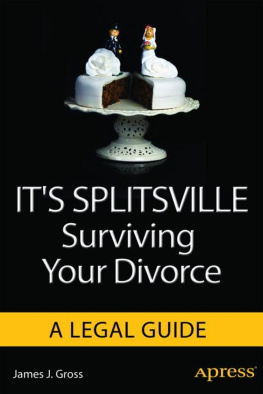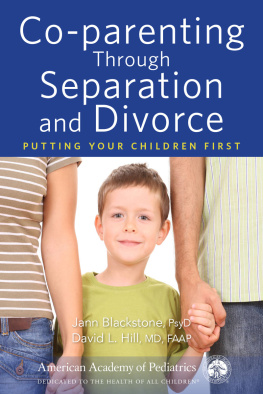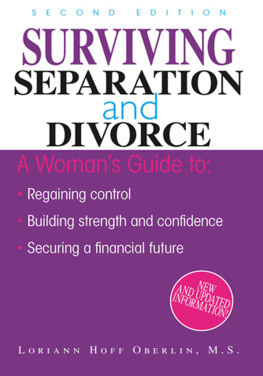CHILDHOOD EXPERIENCES OF SEPARATION AND DIVORCE
Reflections from young adults
Susan Kay-Flowers
First published in Great Britain in 2019 by
Policy Press University of Bristol 1-9 Old Park Hill Bristol BS2 8BB UK Tel +44 (0)117 954 5940 e-mail
North American office: Policy Press c/o The University of Chicago Press 1427 East 60th Street Chicago, IL 60637, USA t: +1 773 702 7700 f: +1 773-702-9756 e:
Policy Press 2019
British Library Cataloguing in Publication Data
A catalogue record for this book is available from the British Library
Library of Congress Cataloging-in-Publication Data
A catalog record for this book has been requested
ISBN 978-1-4473-3866-6 paperback
ISBN 978-1-4473-3865-9 hardcover
ISBN 978-1-4473-3868-0 ePub
ISBN 978-1-4473-3869-7 Mobi
ISBN 978-1-4473-3867-3 ePdf
The right of Susan Kay-Flowers to be identified as author of this work has been asserted by her in accordance with the Copyright, Designs and Patents Act 1988.
All rights reserved: no part of this publication may be reproduced, stored in a retrieval system, or transmitted in any form or by any means, electronic, mechanical, photocopying, recording, or otherwise without the prior permission of Policy Press.
The statements and opinions contained within this publication are solely those of the author and not of the University of Bristol or Policy Press. The University of Bristol and Policy Press disclaim responsibility for any injury to persons or property resulting from any material published in this publication.
Policy Press works to counter discrimination on grounds of gender, race, disability, age and sexuality.
Cover design by Robin Hawes
Front cover image: istock
Readers Guide
This book has been optimised for PDA.
Tables may have been presented to accommodate this devices limitations.
Image presentation is limited by this devices limitations.
To my father, Jack,
husband, Gez,
and children, Laura, Emma and David
Contents
Figures and tables
Figures
Tables
Acknowledgements
My thanks go to the many people involved in this research study and those who supported the writing of this book. In particular I want to thank: the focus group members; those involved in constructing the PSV, the actors and Shaun Jeffers, the film maker; Pete Evans, the data manager; Chris Gillies who helped create the framework; Karen Brown and Dominic Cummings for many fruitful discussions; Peter Moss, Emeritus Professor at the Institute of Education, London, for supporting the initial idea for the book; Liverpool John Moores University for supporting my doctoral studies and the team at the Policy Press.
Most of all I want to thank the young adults who contributed to the study by recounting their experience, the bounds of confidentiality prevent me referring to you by name but you know who you are. I aimed to give voice to your experience, I hope I have done justice to your accounts.
Then there are those who encouraged and supported me on the journey through the doctoral study to completion of this book; my thanks go to the Circle of Trust for always being there; to my children who endured and then supported the experience as they matured; to my father for always believing in me and creating the opportunities he didnt have and finally to my husband, who has been my rock throughout and without whom this would not have been possible.
ONE
Introduction
The effect of parental separation and divorce on children has been an area of considerable interest, leading to the creation of an extensive body of academic research over the last four decades. Many studies have focused on outcomes for children (see Rodgers and Pryor, 1998); more recent studies have sought to give voice to childrens experience (Dunn and Deater-Deckard, 2001; Butler et al, 2002; 2003; Wade and Smart, 2002; Flowerdew and Neale, 2003; Moxnes, 2003; Hogan et al, 2003; Smith et al, 2003; Smart, 2006; Bagshaw, 2007; Campbell, 2008; Halpenny et al, 2008; Menning, 2008; Maes et al, 2011). In these studies childrens voices have been mediated by parents who act as gatekeepers to their participation. Meanwhile the voices of young adults on their childhood experience of parental separation and divorce have remained largely absent from this body of research, Fortin et al (2012) and more recently Du Plooy and Van Rensburg (2015), Brand et al (2017) and Morrison et al (2017) being exceptions. Their absence is curious as young adults appear particularly well placed to contribute to understandings of childrens experience. In their case, separation occurred some time ago, allowing time for adjustment, and their transition to adulthood provides the opportunity to look back on their childhood experience in a different light. Giving voice to their childhood experience provides valuable insight into what young adults saw as significant when their parents separated and post-separation changes were put in place, and how they accommodated the changes in their family life over time.
This book is based on a doctoral study (Kay-Flowers, 2014) which aimed to address this gap by providing the opportunity for young adults to talk about how they experienced their parents separation and the post-separation changes that affected their lives as children. My motivation was to ensure young adults voices are heard in order to develop more nuanced understandings of childrens experience, understandings which could be shared with academic audiences as well as practitioners to inform future work with children, young people and their families.
I had a personal motivation for undertaking the study, in my professional life I worked as a Family Court Advisor with the Children and Family Court Advisory Service (CAFCASS) working with children and families affected by parental separation, divorce or bereavement. Part of my role involved ascertaining childrens wishes and feelings about their family situation (Section 7 of Children Act 1989), these were then set within the wider context of the welfare checklist in order to report the childs best interests to the court. Representing childrens wishes and feelings in written court reports made available to their parents presented challenges with childrens voices often translated into a more acceptable register in part to protect children, as practitioners feared parents might not like what children said about them (James, 2007, 267). This study would give voice to childrens experience of parental separation without adult mediation.
The book reports findings from the qualitative research study which was conducted with young adults (aged 18 to 30 years). The study sought to learn about their lived experience, to understand aspects of experience which they considered important at the time and how they felt about their parents separation and post-separation changes as they looked back now as young adults.
I worked with a group of young people to design the study and create the research tools. The internet was seen as the most suitable environment for young adults to talk openly about their personal experience of parental separation, with an online questionnaire a means of protecting their identity. It was questioned whether on its own this would generate sufficient interest to encourage participation. Focus group discussions suggested the construction of a short video clip about childrens experience of parental separation would stimulate interest in the study and aid young adults reflections: this became the way forward.




